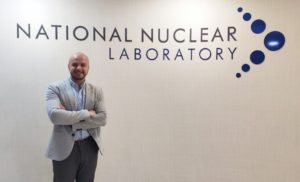Mike Kallo did a PhD in Chemical Engineering and tells us how he has used the skills from research in his current role in R&D at the National Nuclear Laboratory.
What do you do day-to-day in your current role?
I work in a Research & Development environment in the Chemical and Process Modelling Team. On a daily basis, I run computer simulations with Chemical Engineering/Chemistry software for nuclear waste management and treatment. As NNL is placed between academia and industry I may attend several meetings which the context may be more academic or more industry focused but the primary goal is linking the two. As part of my daily duties I have been enrolled in NNL’s post-doctorate scheme, which was launched for the very first time (October 2021) a few months after I started in the company. This is a great opportunity for young professionals with a PhD to get smoothly introduced into the Nuclear Energy sector. Other daily activities include, programming, literature reviews, attending workshops and seminars.
Give a brief overview of your career history to date, and any steps you feel were important to you.
I got my MEng at University of Patras, Greece. After that I joined the Department of Chemical Engineering at University of Bath to pursue a PhD in Computational Chemistry and Molecular Simulations. Joining the PhD research programme at University of Bath and working with my thesis’ supervisor, Dr. Matthew Lennox, immensely developed my understanding of engineering and science, and it opened up opportunities that I had not imagined before, such as working for the National Nuclear Laboratory.
It is very important that you enjoy what you do. I am very grateful that my personal values align with NNL’s values, to tackle the climate change which is probably the most challenging problem of our generation. It is really fulfilling to know that what you do on a daily basis has a positive impact on the society and NNL’s primary purpose is nuclear science to benefit society.
How do you use the skills from your doctoral/postdoctoral experience in your current role?
The PhD process can be a steep learning curve, that transforms the way you think and approach a problem. You learn how to ask the right questions that will lead to understanding a problem better and solving it. During a PhD you are in charge of a project and responsible for its delivery. You learn how to do project management, time management, and make research decisions that will need to be defended in a PhD viva voce by a panel of experts. It is very unlikely that you would be given such responsibilities early on in industry. During my PhD I developed creativity skills, which are essential in an R&D environment, and can-do attitude. These soft skills are by far more important than highly technical skills such as knowing how to code in a specific programming language or running a particular software since both of them get outdated eventually, but the soft skills developed are permanent.
How did you go about about finding your current job and what advice you would give to researchers interested in working in similar roles?
I saw the role advertised on Indeed. Initially, I was wondering whether I should apply since by reading the job description I did not get a full understanding of the role. So, my advice would be to apply and find out more during the interview. A lot of jobs are advertised on LinkedIn, so it is worth setting an up to date profile. Also, I asked different people and services (academics, industry professionals and the Careers Services at University of Bath) for feedback on the way I presented my CV.
Respond

